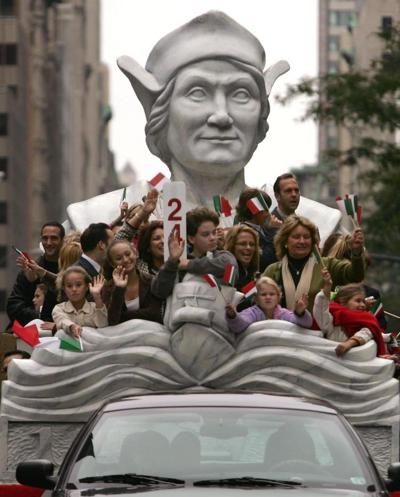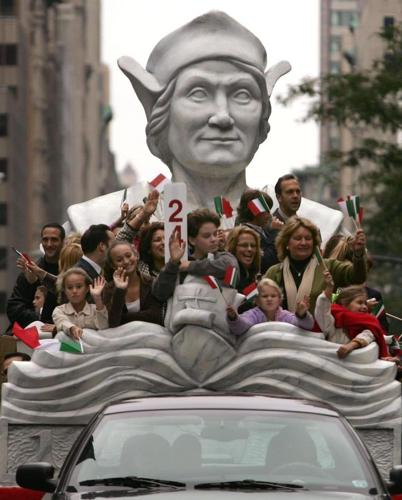On Oct. 8, 2021, President Joe Biden became the first U.S. president to formally honor people native to the U.S. with a presidential proclamation designating Oct. 11, 2021, as Indigenous Peoples’ Day. On the same day, he issued a proclamation recognizing Oct. 11, 2021, as Columbus Day, commemorating the day Europeans landed in the Americas changing the course of history forever. Two proclamations for the same day signifying very different things to different people. What’s going on here?
The answer is, like so many conversations around the history and culture of our nation, complicated. Today, Columbus Day is a federal holiday in the U.S. observed by the closure of U.S. federal government offices and banks. Schools typically stay open as do most businesses. The day is also commemorated in many other countries including the Bahamas and Colombia as Discovery Day, in Venezuela, as Día de la Resistencia Indígena, in Spain, as Fiesta Nacional, and in much of Latin America as Día de la Raza. But it hasn’t always been this way.
In fact, it wasn’t until 1937 that Congress and President Franklin D. Roosevelt made Columbus Day a national holiday to be observed on Oct. 12. Until then, the nation had considered its roots in British colonization more central to its identity than the claims of Columbus and his successors. The holiday was later moved to the second Monday in October, this year Oct. 10, to give workers a long holiday weekend.
In his 2021 Columbus Day proclamation, President Biden remarked on the courage and spirit of the 15th century Italian explorer and the many Italians who would follow “risking poverty, starvation, and death in pursuit of a better life.” In this sense, the holiday marks the intrepid contributions of Columbus, his contemporaries and the “millions of Italian Americans who continue to enrich our country’s traditions and culture and make lasting contributions to our Nation,” notes the proclamation.It’s why many proud Italian Americans in Chicago and other major U.S. cities will mark this Oct. 10 with festive heritage parades and celebrations donning colorful costumes, music and Italian food.
Today, however, it’s widely accepted among historians that Columbus wasn’t the first explorer, but likely a distant second or third, to walk the shores of North America, having been outpaced by earlier Viking or possibly Polynesian adventurers. Indigenous people, too, had been living in the Americas for centuries before Columbus’ arrival.
But although the title of “first to discover” can’t go to Columbus, the impact of the arrival of Europeans on this land can be reliably traced to him. And for the indigenous people already living here, the impact was devastating. Within just a few decades of Columbus’ arrival, disease, subjugation, enslavement and the appropriation of native land decimated entire populations and traditions of people who had lived here for thousands of years.
In his Indigenous Peoples’ Day proclamation, Biden acknowledges we “must never forget the centuries-long campaign of violence, displacement, assimilation, and terror wrought upon Native communities and Tribal Nations throughout our country.” Recognizing the inherent sovereignty of the people who were here long before the colonization of the Americas began, “we recognize Indigenous peoples’ resilience and strength as well as the immeasurable positive impact that they have made on every aspect of American society. We also recommit to supporting a new, brighter future of promise and equity for Tribal Nations,” the proclamation says.
Recognizing the negative impact of Columbus’ arrival on indigenous people, a growing number of U.S. states, cities and localities have established alternatives to Columbus Day. In California, Berkeley, Sebastopol and Santa Cruz have replaced Columbus Day with Indigenous Peoples’ Day. South Dakota renamed the holiday Native American Day, and Alabama celebrates a combination of Columbus Day and American Indian Heritage Day. Hawaii calls it Discovery Day to commemorate the arrival of Polynesian settlers, according to the U.S. Embassy.
Further complicating his legacy, Columbus died believing he had discovered a new trade route to India and mistakenly identified the people he met as “Indians.” Around the same time, an Italian merchant named Amerigo Vespucci, who actually outfitted the ship Columbus took on his third voyage, was making a name for himself.
In 1499, seven years after Columbus first landed, Vespucci made his first voyage westward. It was on his second trip that he realized the egregious mistake of his predecessors. This isn’t India at all, he revealed to the people back home, but an entirely new continent. As a result, today we live in America, named not for the man who first crossed the Atlantic to land in the “new world” but the man who first recognized it was a new world.
Columbus Day continues to evoke discussions around ideas of exploration, discovery, colonization and all they entail, including injustices to indigenous people. However you choose to pass this Oct. 10, know that the tale of the history and development of our nation, a living work in progress, is about more than one man in 1492 who sailed the ocean blue. It’s about making mistakes, recognizing them and becoming stronger together as we make them right.
By the way, no one knows for sure if Columbus actually was Italian or if his name was even Columbus at all. But that’s a different story.









(0) comments
Welcome to the discussion.
Log In
Keep it Clean. Please avoid obscene, vulgar, lewd, racist or sexually-oriented language.
PLEASE TURN OFF YOUR CAPS LOCK.
Don't Threaten. Threats of harming another person will not be tolerated.
Be Truthful. Don't knowingly lie about anyone or anything.
Be Nice. No racism, sexism or any sort of -ism that is degrading to another person.
Be Proactive. Use the 'Report' link on each comment to let us know of abusive posts.
Share with Us. We'd love to hear eyewitness accounts, the history behind an article.